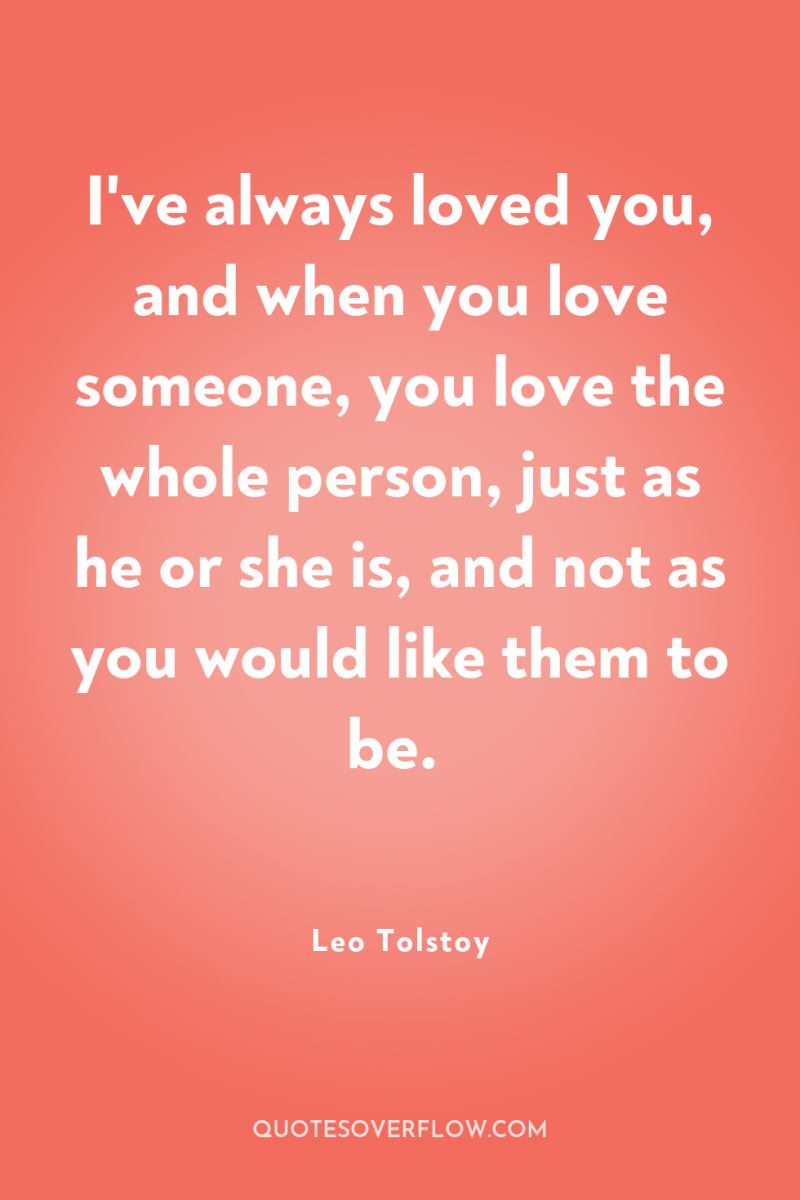
1
I've always loved you, and when you love someone, you love the whole person, just as he or she is, and not as you would like them to be.Leo Tolstoy
2
Freddie experienced the sort of abysmal soul-sadness which afflicts one of Tolstoy's Russian peasants when, after putting in a heavy day's work strangling his father, beating his wife, and dropping the baby into the city's reservoir, he turns to the cupboards, only to find the vodka bottle empty.P.g. Wodehouse
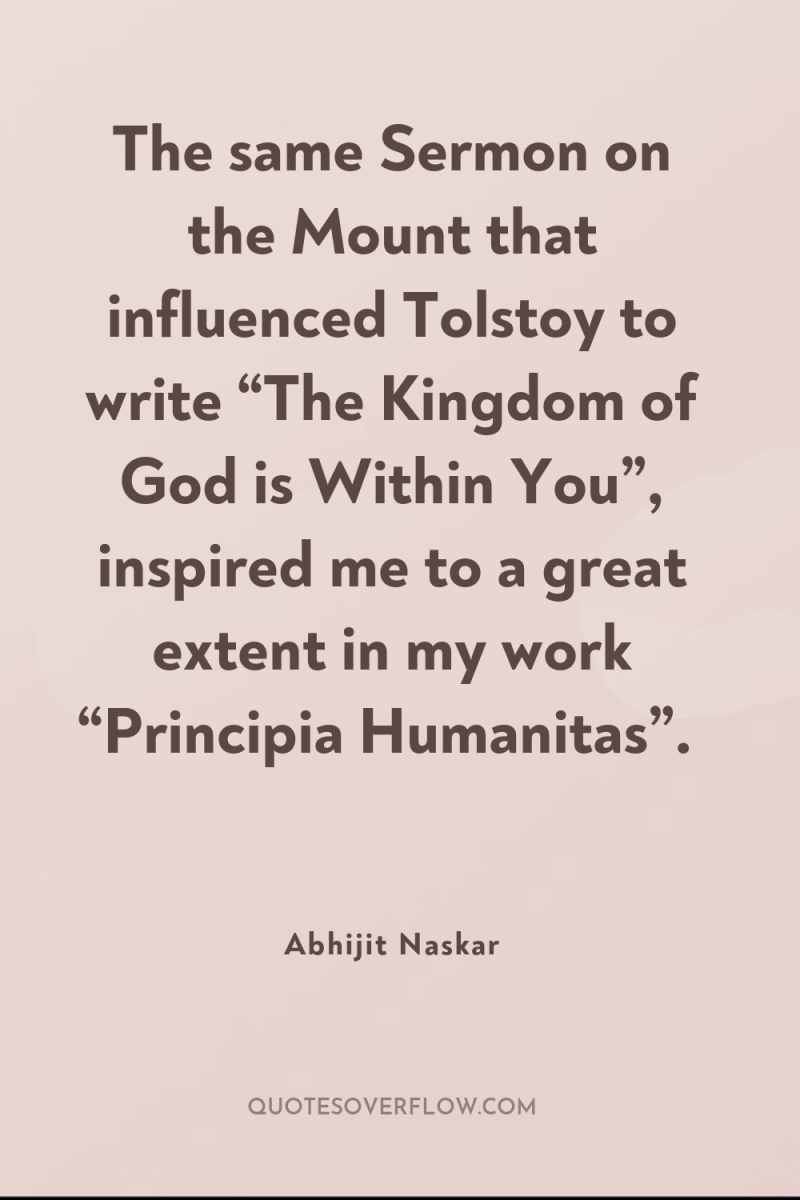
3
The same Sermon on the Mount that influenced Tolstoy to write “The Kingdom of God is Within You”, inspired me to a great extent in my work “Principia Humanitas”.Abhijit Naskar
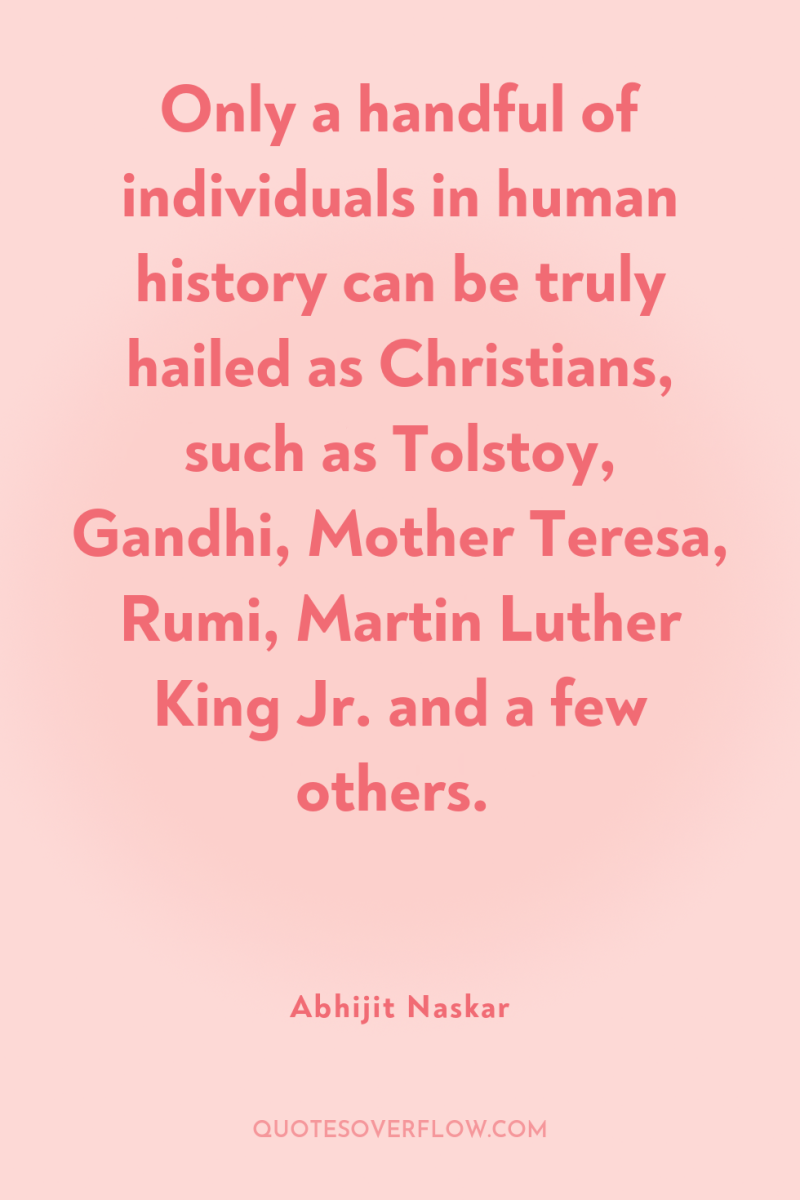
4
Only a handful of individuals in human history can be truly hailed as Christians, such as Tolstoy, Gandhi, Mother Teresa, Rumi, Martin Luther King Jr. and a few others.Abhijit Naskar
5
..And there really are men who believe in this, who spend their time in promoting Leagues of Peace, in delivering addresses, and in writing books; and of course the governments sympathize with it all, pretending that they approve of it; just as they pretend to support temperance, while they actually derive the larger part of their income from intemperance; just as they pretend to maintain liberty of the constitution, when it is the absence of liberty to which they owe their power; just as they pretend to care for the improvement of the laboring classes, while on oppression of the workman rest the very foundations of the State; just as they pretend to uphold Christianity, when Christianity is subversive of every government.Leo Tolstoy
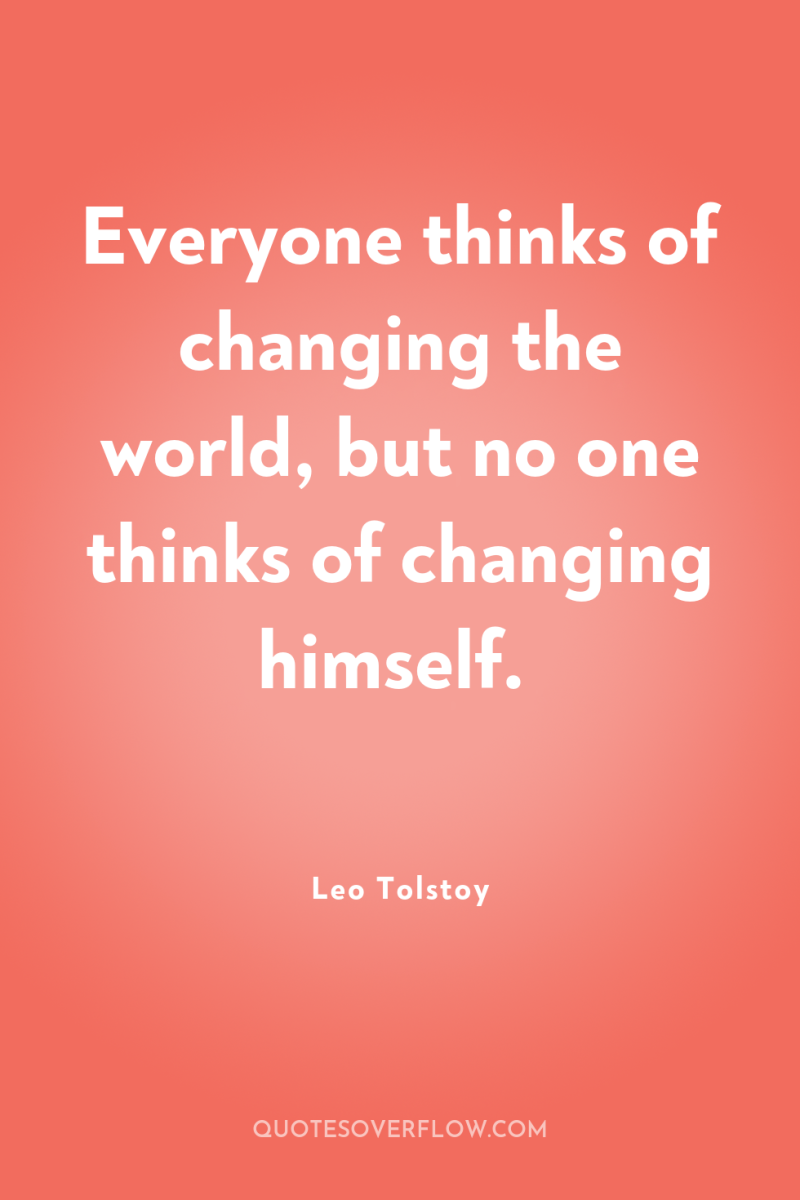
6
Everyone thinks of changing the world, but no one thinks of changing himself.Leo Tolstoy
7
[Tolstoy] denounced [many historians'] lamentable tendency to simplify. The experts stumble onto a battlefield, into a parliament or public square, and demand, "Where is he? Where is he?" "Where is who?" "The hero, of course! The leader, the creator, the great man! " And having found him, they promptly ignore all his peers and troops and advisors. They close their eyes and abstract their Napoleon from the mud and the smoke and the masses on either side, and marvel at how such a figure could possibly have prevailed in so many battles and commanded the destiny of an entire continent. "There was an eye to see in this man, " wrote Thomas Carlyle about Napoleon in 1840, "a soul to dare and do. He rose naturally to be the King. All men saw that he was such." But Tolstoy saw differently. "Kings are the slaves of history, " he declared. "The unconscious swarmlike life of mankind uses every moment of a king's life as an instrument for its purposes." Kings and commanders and presidents did not interest Tolstoy. History, his history, looks elsewhere: it is the study of infinitely incremental, imperceptible change from one state of being (peace) to another (war).The experts claimed that the decisions of exceptional men could explain all of history's great events. For the novelist, this belief was evidence of their failure to grasp the reality of an incremental change brought about by the multitude's infinitely small actions. .Daniel Tammet
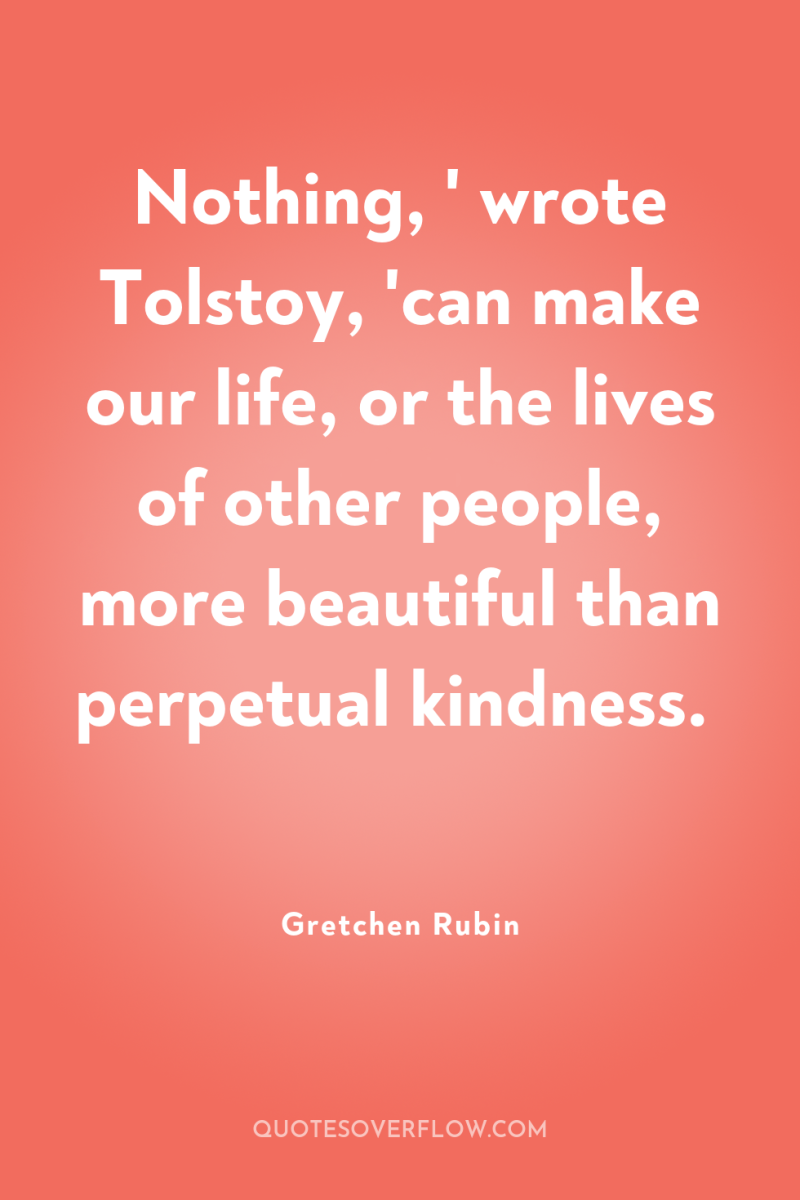
8
Nothing, ' wrote Tolstoy, 'can make our life, or the lives of other people, more beautiful than perpetual kindness.Gretchen Rubin
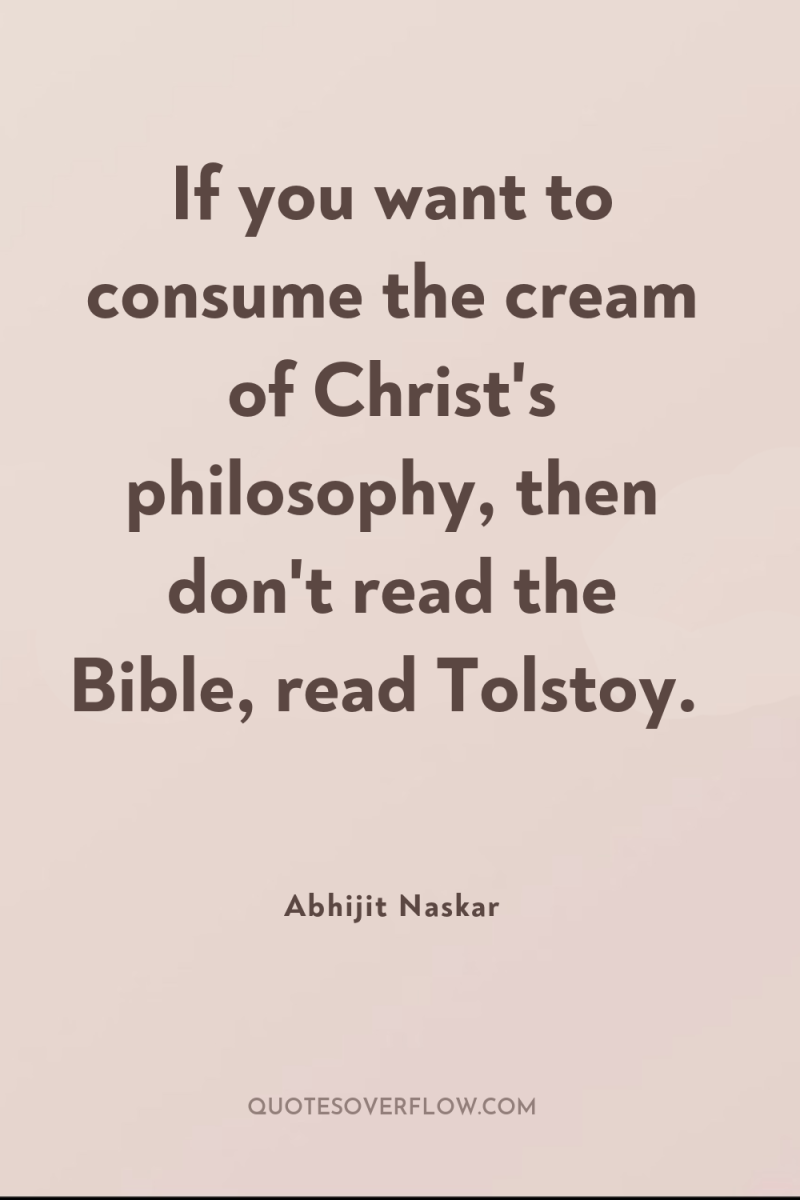
9
If you want to consume the cream of Christ's philosophy, then don't read the Bible, read Tolstoy.Abhijit Naskar
10
Art is bad when ‘you see the intent and get put off.’ (Goethe) In Tolstoy one is unaware of the intent, and sees only the thing itself. from the book, On Retranslating A Russian Classic Anna Karenina by Leo TolstoyJoel Carmichael
11
There is history the way Tolstoy imagined it, as a great, slow-moving weather system in which even tsars and generals are just leaves before the storm. And there is history the way Hollywood imagines it, as a single story line in which the right move by the tsar or the wrong move by the general changes everything. Most of us, deep down, are probably Hollywood people. We like to invent “what if” scenarios--what if x had never happened, what if y had happened instead?--because we like to believe that individual decisions make a difference: that, if not for x, or if only there had been y, history might have plunged forever down a completely different path. Since we are agents, we have an interest in the efficacy of agency.Louis Menand
12
Tolstoy was perfectly right to protest that history is not made to happen by the combination of such obscure entities as the ‘power’ or ‘mental activity’ assumed by naïve historians; indeed he was, in Kareev’s view, at his best when he denounced the tendency of metaphysically minded writers to attribute causal efficacy to, or idealise, such abstract entities as ‘heroes’, ‘historic forces’, ‘moral forces’, ‘nationalism’, ‘reason’ and so on, whereby they simultaneously committed the two deadly sins of inventing non-existent entities to explain concrete events and of giving free reign to personal, or national, or class, or metaphysical bias.Isaiah Berlin
13
The endless ocean was his sole companion , and on some deeply sentimental level, it seemed sufficient. Almost apt. He aligned himself with Thoreau and Tolstoy, he felt like their peers. The kinship with nature devoted humans to a mythical state, a heightened persona beyond the reach of mere mortals. At least that was what he told himself on the lonely nights when insomnia played on his fears and the howling wind pierced through his soul.Adelheid Manefeldt
14
I know that I am going to meet a personal variation on reality; a partial view of reality. But I know also that by that partiality, that distancing from the shared experience, it will be new: a revelation. It will be a vision, a more or less powerful or haunting dream. A space-voyage through somebody else's psychic abysses. It will fall short of tragedy, because tragedy is the truth, and truth is what the very great artists, the absolute novelists, tell. It will not be truth; but it will be imagination. Truth is best. For it encompasses tragedy and partakes of the eternal joy. But very few of us know it; the best we can do is recognize it. Imagination - to me - is the next best. For it partakes of Creation, which is one aspect of the eternal joy. All the rest is either Politics or Pedantry, or Mainstream Fiction, may it rest in peace.Unknown
15
One day at Fenner's (the university cricket ground at Cambridge), just before the last war, G. H. Hardy and I were talking about Einstein. Hardy had met him several times, and I had recently returned from visiting him. Hardy was saying that in his lifetime there had only been two men in the world, in all the fields of human achievement, science, literature, politics, anything you like, who qualified for the Bradman class. For those not familiar with cricket, or with Hardy's personal idiom, I ought to mention that “the Bradman class” denoted the highest kind of excellence: it would include Shakespeare, Tolstoy, Newton, Archimedes, and maybe a dozen others. Well, said Hardy, there had only been two additions in his lifetime. One was Lenin and the other Einstein.C.P. Snow
16
Just as a painter needs light in order to put the finishing touches to his picture, so I need an inner light, which I feel I never have enough of in the autumn.Leo Tolstoy
17
Tolstoy said, 'The antagonism between life and conscience may be removed either by a change of life or by a change of conscience.' Many of us have elected to adjust our consciences rather than our lives. Our powers of rationalization are unlimited. They allow us to live in luxury and indifference while others, whom we could help if we chose to, starve and go to hell.Randy Alcorn
18
[Tolstoy] does not necessarily get rid of [his angry] temperament by undergoing religious conversion, and indeed it is obvious that the illusion of having been reborn may allow one's native vices to flourish more freely than ever, though perhaps in subtler forms.George Orwell
19
Tolstoy was a Caucasian, Gandhi was an Asian, and Martin Luther King Jr. was a Negro, yet all of their hearts were inspired by the one idea of nonviolent resistance. King received it from Gandhi, Gandhi received it from Tolstoy, and Tolstoy received it from Christ.Abhijit Naskar
20
In my considered opinion, salary is payment for goods delivered and it must conform to the law of supply and demand. If, therefore, the fixed salary is a violation of this law - as, for instance, when I see two engineers leaving college together and both equally well trained and efficient, and one getting forty thousand while the other only earns two thousand , or when lawyers and hussars, possessing no special qualifications, are appointed directors of banks with huge salaries - I can only conclude that their salaries are not fixed according to the law of supply and demand but simply by personal influence. And this is an abuse important in itself and having a deleterious effect on government service.Leo Tolstoy
21
...Tolstoy said, happiness is an allegory, unhappiness a story - then what does that make us?...John Geddes
22
And not only the pride of intellect, but the stupidity of intellect. And, above all, the dishonesty, yes, the dishonesty of intellect. Yes, indeed, the dishonesty and trickery of intellect.Leo Tolstoy
23
I often think with regret of that fresh, beautiful feeling of boundless, disinterested love which came to an end without having ever found self-expression or return. It is strange how, when a child, I always longed to be like grown-up people, and yet how I have often longed, since childhood's days, for those days to come back to me!Leo Tolstoy
24
What better time is there in our lives than when the two best of virtues-innocent gaiety and a boundless yearning for affection-are our sole objects of pursuit?Leo Tolstoy
25
Not having yet passed through those bitter experiences which enforce upon older years circumspection and coldness, I deprived myself of the pure delight of a fresh, childish instinct for the absurd purpose of trying to resemble grown-up people.Leo Tolstoy
26
The world is kept alive only by heretics: the heretic Christ, the heretic Copernicus, the heretic Tolstoy. Our symbol of faith is heresy. (“Tomorrow”)Yevgeny Zamyatin
27
In Russia, the person who put Sevastopol on the literary map was Leo Tolstoy, a veteran of the siege. His fictionalized memoir The Sebastopol Sketches made him a national celebrity. Already with the first installment of the work published, Tsar Alexander II saw the propaganda value of the piece and ordered it translated into French for dissemination abroad. That made the young author very happy. Compared with Tolstoy’s later novels, The Sebastopol Sketches hasn’t aged well, possibly because this is not a heartfelt book. As the twenty-six-year-old Tolstoy’s Sevastopol diaries reveal, not heartache but ambition drove him at the time. Making a name as an author was just an alternative to two other grand plans–founding a new religion and creating a mathematical model for winning in cards (his losses during the siege were massive even for a rich person). .Constantine Pleshakov
28
They certified that I was sane; but I know that I am mad." This confession gives us the key to what is most important and significant in Tolstoy's hidden life.Lev Shestov
29
If they hadn’t both been pretending, but had had what is called a heart-to-heart talk, that is, simply told each other just what they were thinking and feeling, then they would just have looked into each other’s eyes, and Constantine would only have said: ‘You’re dying, dying, dying! ’ — while Nicholas would simply have replied: ‘I know I’m dying, but I’m afraid, afraid, afraid! ’ That’s all they would have said if they’d been talking straight from the heart. But it was impossible to live that way, so Levin tried to do what he’d been trying to do all his life without being able to, what a great many people could do so well, as he observed, and without which life was impossible: he tried to say something different from what he thought, and he always felt it came out false, that his brother caught him out and was irritated by it.Leo Tolstoy
30
Every novel says to the reader: “Things are not as simple as you think.” That is the novel’s eternal truth, but it grows steadily harder to hear amid the din of easy, quick answers that come faster than the question and block it off. In the spirit of our time, it’s either Anna or Karenin who is right, and the ancient wisdom of Cervantes, telling us about the difficulty of knowing and the elusiveness of truth, seems cumbersome and useless.Milan Kundera
31
He stepped down, avoiding any long look at her as one avoids long looks at the sun, but seeing her as one sees the sun, without looking.Leo Tolstoy
32
Ultimately it is the Christian attitude which is self-interested and hedonistic, since the aim is always to get away from the painful struggle of earthly life and find eternal peace in some kind of Heaven or Nirvana. The humanist attitude is that the struggle must continue and that death is the price of life.George Orwell
33
This, for both Schopenhauer and Tolstoy, is the central tragedy of human life; if only men would learn how little the cleverest and most gifted among them can control, how little they can know of all the multitude of factors the orderly movement of which is the history of the world; above all, what presumptuous nonsense it is to claim to perceive an order merely on the strength of believing desperately that an order must exist, when all one actually perceives is meaningless chaos —a chaos of which the heightened form, the microcosm in which the disorder of human life is reflected in an intense degree, is war.Isaiah Berlin
34
God help me, how Tolstoy sweats over drying up people's sources of life, of wild and joyful life, drying them up and making the world fat with the love of God and everyman.. But the man is old, after all, his fountains of life run dry, without a trace remaining of human affections.. Only someone who has become slow and watertight with old age, satiated and hardened with pleasure, will go to youth and say, Renounce! .. And yet the youth renounces nothing, but sins royally for forty years. Such is the course of nature! .Knut Hamsun
35
The Lord had given them the day and the Lord had given them the strength. And the day and the strength had been dedicated to labor, and the labor was its reward. Who was the labor for? What would be its fruits? These were irrelevant and idle questions.Leo Tolstoy
36
Gordie, the white boy genius, gave me this book by a Russian dude named Tolstoy, who wrote, 'Happy families are all alike; every unhappy family is unhappy in its own way.' Well, I hate to argue with a Russian genius, but Tolstoy didn't know Indians, and he didn't know that all Indian families are unhappy for the same exact reasons: the frikkin' booze.Sherman Alexie
37
In the post- Warhol era a single gesture such as uncrossing one's legs will have more significance than all the pages in War and Peace.J.G. Ballard